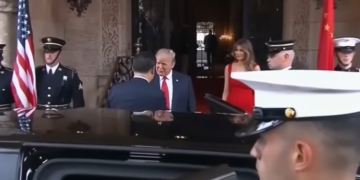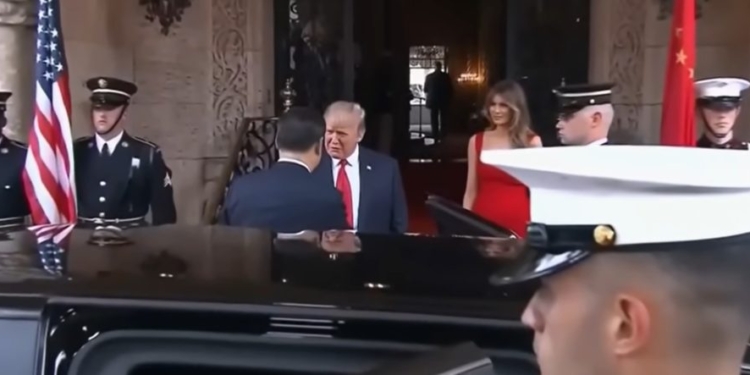“China and the United States can together solve all of the problems of the world, if you think about it,” President-Elect Donald Trump said on December 16, at a Mar-a-Lago press conference.
He also called China’s President Xi Jinping “amazing” and confirmed he had invited the Chinese leader to his inauguration.
Earlier in the month, Trump met with Ukrainian President Volodymyr Zelensky in Paris and stated this in connection with efforts to end the war in Eastern Europe: “China can help.”
The victorious Trump of December was noticeably more friendly to China than the Trump of the long, grueling campaign. During the campaign, the Republican candidate was often in trade-war mode, promising to impose an additional across-the-board tariff of more than 60% on all Chinese goods.
“Trump wants to keep them all guessing,” Gregory Copley, president of the International Strategic Studies Association, told Gatestone after the Mar-a-Lago press event. So which Trump will we see starting at noon on January 20, 2025?
Only one individual truly knows, and Trump himself is not showing his hand. In any event, trying to reach a grand bargain with China — what he was hinting at — would be exactly the wrong approach at this or any other moment.
Trump, of course, likes to make deals — famously he is the co-author of Trump: The Art of the Deal — and he could very well be looking to strike one with the Chinese regime. As Michael Schuman, writing in The Atlantic, pointed out, “a ‘grand bargain’ with Beijing has obvious appeal.”
Solving all the world’s problems, something Trump believes Xi and he can do, would ideally be one of them.
There are, however, problems confronting the next American president as he looks to strike a deal with Beijing. As an initial matter, Trump has already tried to reach an accommodation with China: his Phase One Trade pact of January 2020. He calls it “the best trade deal” ever, but it is now widely viewed as a bust. The Chinese, during an election year in America, never honored its terms. It is unlikely that Trump can do better this time with a Xi Jinping who is even far more arrogant than he was four years ago.
Second, Trump, despite what he says, does not have a good relationship with Xi. “What Mr. Trump does not recognize is that the Chinese cultural concept of ‘friendship’ is a transactional relationship,” Charles Burton of the Sinopsis think tank told Gatestone. “Xi will never be his buddy because he sees himself as making his mark in Chinese history by becoming the global hegemonic successor to emperors of China’s self-defined glory days and to whom all must abase themselves in affirmation.”
As Burton, who once served as a Canadian diplomat in Beijing, notes: “Xi wants to manipulate the U.S. president into becoming aligned with the Chinese Communist Party’s worldview and ambitions and fecklessly abandon U.S. global leadership.”
Burton has it right. For decades, American presidents believed they could cooperate with Chinese communists, and State Department diplomats thought they could make China a “responsible stakeholder” in the international system. Yet, whenever American leaders after the Cold War worked with Beijing on the issues of the day, their diplomacy produced horrible results, something particularly evident during the Global War on Terrorism, the Six-Party Talks to “denuclearize” North Korea, and the war in Ukraine.
American hopes of cooperation with China were always unrealistic. As Burton suggests, the Chinese regime has from the beginning dreamed of replacing the Westphalian international order of sovereign states with the Chinese imperial-era system in which emperors believed they not only had the Mandate of Heaven to rule tianxia — “All Under Heaven” — but they also were compelled by Heaven to do so.
Worse, Xi apparently believes that the United States, because of its inspirational impact on the Chinese people, poses an existential threat to his Communist Party rule. New York Times columnist Thomas Friedman can argue that China should “let in more Taylor Swifts,” but that is exactly what Xi Jinping, who has been relentlessly attacking foreign culture, does not want to do.
Third, Trump faces an additional hurdle in his hoped-for dealings with the Chinese leader: Xi probably no longer has the clout in Beijing he once possessed. The new American president can make a deal with Xi, but the arrangement may not stick because of discord inside China’s increasingly turbulent ruling group.
“Trump knows that Xi Jinping has been brought back under control by the Communist Party of China and by his loss of a power base within the People’s Liberation Army,” Copley, who is also editor-in-chief of Defense & Foreign Affairs Strategic Policy, pointed out. The issue is whether the Chinese leader still has the power to act. Xi is embattled: There are signs and hints of instability across his regime.
Moreover, thanks to Xi, only the most hostile answers are considered politically acceptable in Beijing, so it would be hard for him to compromise and, more important, to honor promises. Xi has based his policies during the last decade on the premise that China is ascendant. His signature line, from a speech in December 2020, is “the East is rising and the West is declining.”
An arrogant Xi Jinping is clearly in no mood to come to terms with Trump — or anyone else for that matter.
Xi’s hostile conduct is not something he is prepared to bargain away. On the contrary, his actions are the inevitable result of China’s communist political system, which idealizes violence, struggle and domination. This system means there can be no accommodation with the Communist Party.
The Chinese regime believes the world is its enemy. No enduring understanding, pact, deal or agreement is possible.
Gordon G. Chang is the author of Plan Red: China’s Project to Destroy America and The Coming Collapse of China, a Gatestone Institute distinguished senior fellow, and a member of its Advisory Board. Follow Gordon G. Chang on X (formerly Twitter)
This piece was republished with permission from the Gatestone Institute.
The views and opinions expressed in this commentary are those of the author and do not reflect the official position of the Daily Caller News Foundation.
(Featured Image Media Credit: Screen Capture/PBS Frontline)
All content created by the Daily Caller News Foundation, an independent and nonpartisan newswire service, is available without charge to any legitimate news publisher that can provide a large audience. All republished articles must include our logo, our reporter’s byline and their DCNF affiliation. For any questions about our guidelines or partnering with us, please contact [email protected].



























 Continue with Google
Continue with Google